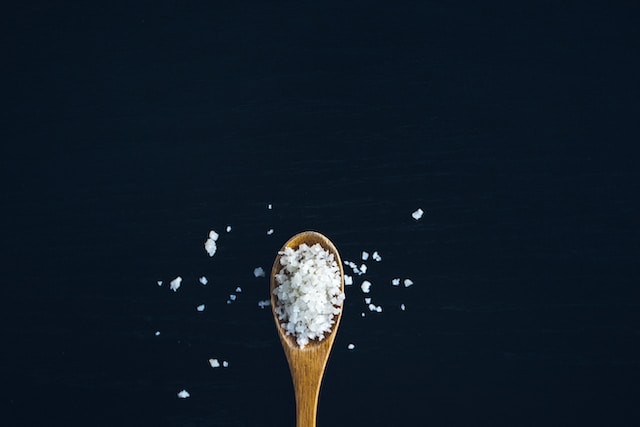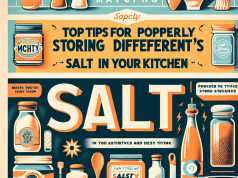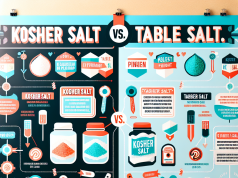Contents
Welcome to our guide on the top 5 best salts for baking!
Why is it important to choose the right salt for baking?
When it comes to baking, the type of salt you use can make a big difference in the flavor and texture of your baked goods. Different salts have different flavors and textures, so choosing the right one can help elevate your baking to the next level.
Which salts are the best for baking?
In this detailed comparison, we will discuss the top 5 best salts for baking and their unique characteristics. Whether you prefer a flaky sea salt for sprinkling on top of cookies or a fine table salt for incorporating into your dough, we have got you covered.
Stay tuned for our detailed comparison!
Introduction
Baking is a science, and every ingredient plays a crucial role in the final outcome. Salt, in particular, is essential for enhancing flavors and helping baked goods rise. In this blog post, we will explore the top 5 best salts for baking and compare their unique qualities.
1. Kosher Salt
Kosher salt is a popular choice among bakers due to its coarse texture and mild flavor. It dissolves easily into doughs and batters, making it a versatile option for all types of baked goods. Many professional bakers swear by kosher salt for its consistent results.
Pros:
- Easy to measure and sprinkle
- Enhances flavor without being too overpowering
Cons:
- May not be ideal for recipes that require precise measurements
2. Sea Salt
Sea salt is harvested from evaporated seawater and contains trace minerals that can add depth to baked goods. Its coarse texture and briny taste make it a favorite among artisan bakers looking to elevate their creations.
Pros:
- Rich in minerals
- Adds a subtle crunch to baked goods
Cons:
- Can be more expensive than other types of salt
3. Pink Himalayan Salt
Pink Himalayan salt is known for its striking pink color and alleged health benefits. While the flavor profile is similar to sea salt, some bakers prefer pink Himalayan salt for its visually appealing aesthetic.
Pros:
- Contains trace minerals like potassium and magnesium
- Imparts a subtle earthy flavor to baked goods
Cons:
- May not be readily available in all grocery stores
4. Fleur de Sel
Fleur de sel, also known as “flower of salt,” is a delicate salt that is hand-harvested from salt marshes. It has a light, flaky texture and a slightly sweet taste, making it a luxurious choice for special occasion baking.
Pros:
- High moisture content for a unique texture
- Subtle flavor that doesn’t overpower other ingredients
Cons:
- Expensive compared to other varieties
5. Table Salt
Table salt is the most commonly used salt in baking due to its fine texture and affordable price point. While it lacks the complexity of other salts, table salt is a reliable option for everyday baking needs.
Pros:
- Accessible and budget-friendly
- Dissolves quickly and evenly
Cons:
- May contain additives like anti-caking agents
Conclusion
Choosing the right salt for baking can make a significant difference in the taste and texture of your creations. Consider experimenting with different types of salt to discover which one best complements your favorite recipes. Whether you opt for the bold flavor of sea salt or the delicate texture of fleur de sel, each salt brings its own unique characteristics to the baking table.
Frequently Asked Questions
Q: What are the best salts for baking?
A: The top 5 best salts for baking are Himalayan pink salt, fleur de sel, kosher salt, sea salt, and table salt. Each salt has its own unique flavor profile and use in baking.
Q: How do I choose the right salt for my baking needs?
A: Consider the recipe you are making and the flavor profile you are looking for. Himalayan pink salt is great for adding a subtle mineral flavor, while kosher salt is ideal for its larger crystals that provide a burst of flavor.
Q: Can I use any salt for baking?
A: While most salts can be used for baking, it’s important to consider the texture, flavor, and intensity of the salt. Some salts may be too strong or too delicate for certain baked goods.
Q: How should I store my baking salts?
A: It’s best to store salts in a cool, dry place away from moisture and heat. This will help maintain the quality and flavor of the salts for longer periods of time.
Q: Are there any specialty salts that are worth trying for baking?
A: Yes, specialty salts like smoked salt, truffle salt, and flavored salts can add unique and gourmet flavors to your baked goods. Experimenting with different salts can elevate the taste of your creations.
Benefits of Using the Best Salt for Baking
When it comes to baking, the type of salt you use can make a big difference in the flavor and texture of your baked goods. Choosing the best salt for baking can enhance the overall taste of your creations and elevate your baking to a whole new level.
Sea Salt
Sea salt is one of the most popular choices for baking, as it is minimally processed and retains its natural minerals. Its coarse texture and clean taste make it a great option for adding a subtle salty flavor to your baked goods.
Kosher Salt
Kosher salt is another excellent choice for baking, as its large grains dissolve easily and evenly distribute throughout the batter. Its mild flavor enhances the overall taste of your baked goods without overpowering other ingredients.
Outbound link:
For more information on different types of salt, visit Wikipedia’s page on salt.
The Top 5 Best Salts for Baking: A Detailed Comparison
- 1. Diamond Crystal Kosher Salt – Best for general baking use
- 2. Maldon Sea Salt Flakes – Ideal for adding a finishing touch
- 3. Morton Coarse Kosher Salt – Perfect for seasoning doughs
- 4. Himalayan Pink Salt – Adds a unique flavor to baked goods
- 5. Celtic Sea Salt – Great for enhancing the flavor of sweet treats








































